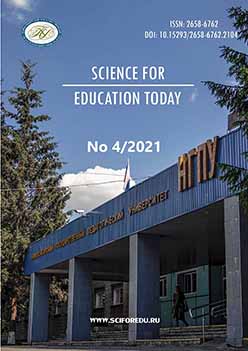Академический обман в цифровой среде: социально-психологический анализ
Digital academic dishonesty: A socio-psychological analysis
Author(s): Svetlana Aleksandrovna Bezgodova, Anastasiya Vladimirovna MiklyaevaSubject(s): Higher Education , Personality Psychology, ICT Information and Communications Technologies, Sociology of Education
Published by: Новосибирский государственный педагогический университет
Keywords: Academic dishonesty; Academic integrity; Digitalization of education; Digital academic dishonesty; Involvement in digital academic dishonesty; Socio-psychological factors; Schoolchildren; Students;
Summary/Abstract: The article presents a review of psychological studies aimed at analyzing digital academic dishonesty (academic misconduct with the use of the Internet). The socio-psychological specifics of digital academic dishonesty, which distinguishes it from traditional forms of academic dishonesty, have been studied quite fragmentally to date. The purpose of this study is to identify socio-psychological factors that determine the involvement of students in digital academic dishonesty in terms of digitalization of education. Materials and Methods. In order to achieve the research goal, we used the method of systematic review of research articles published in 1995-2021 and indexed in the databases ‘Scopus’ and ‘Web of Science’. According to the criteria (relevant keywords; availability of a detailed description of the research program, empirical results; Russian or English), 55 articles were included in the final array of analysis. Results. We identified individual-psychological and contextual-environmental factors of digital academic dishonesty. Individual psychological factors include: students’ attitudes towards digital academic dishonesty; students’ academic experience; students’ personal characteristics; socio-demographic characteristics of students. Contextual and environmental factors include: students’ attitude to the prevalence of digital academic dishonesty among peers; teachers’ attitude to digital academic dishonesty; institutional policy on digital academic dishonesty. Conclusions. The authors conclude that the socio-psychological risk factors for involving schoolchildren and students in digital academic dishonesty are their previous experience of academic dishonesty, the idea of the acceptability of this form of academic behavior, the lack of educational motivation and self-regulation, insufficient level of knowledge and information competence (individual psychological factors), as well as the prevalence of digital academic dishonesty in an educational institution with the background of the lack of an institutional policy to prevent digital academic dishonesty and relevant actions of teachers (contextual and environmental factors).
Journal: Science for Education Today
- Issue Year: 11/2021
- Issue No: 4
- Page Range: 64-90
- Page Count: 27
- Language: Russian

